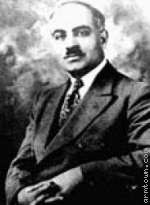Friday, 12 October 2007
The story of the last century's first Holocaust – Winston Churchill used this very word about the Armenian genocide years before the Nazi murder of six million Jews – is well known, despite the refusal of modern-day Turkey to acknowledge the facts. Nor are the parallels with Nazi Germany's persecution of the Jews idle ones.
Turkey's reign of terror against the Armenian people was an attempt to destroy the Armenian race. While the Turks spoke publicly of the need to "resettle" their Armenian population – as the Germans were to speak later of the Jews of Europe – the true intentions of Enver Pasha's Committee of Union and Progress in Constantinople were quite clear.
On 15 September 1915, for example (and a carbon of this document exists), Talaat Pasha, the Turkish Interior minister, cabled an instruction to his prefect in Aleppo about what he should do with the tens of thousands of Armenians in his city. "You have already been informed that the government... has decided to destroy completely all the indicated persons living in Turkey... Their existence must be terminated, however tragic the measures taken may be, and no regard must be paid to either age or sex, or to any scruples of conscience."
These words are almost identical to those used by Himmler to his SS killers in 1941.
Taner Akcam, a prominent – and extremely brave – Turkish scholar who has visited the Yerevan museum, has used original Ottoman Turkish documents to authenticate the act of genocide. Now under fierce attack for doing so from his own government, he discovered in Turkish archives that individual Turkish officers often wrote "doubles" of their mass death-sentence orders, telegrams sent at precisely the same time that asked their subordinates to ensure there was sufficient protection and food for the Armenians during their "resettlement". This weirdly parallels the bureaucracy of Nazi Germany, where officials were dispatching hundreds of thousands of Jews to the gas chambers while assuring International Red Cross officials in Geneva that they were being well cared for and well fed.
Ottoman Turkey's attempt to exterminate an entire Christian race in the Middle East – the Armenians, descended from the residents of ancient Urartu, became the first Christian nation when their king Drtad converted from paganism in AD301 – is a history of almost unrelieved horror at the hands of Turkish policemen and soldiers, and Kurdish tribesmen.
In 1915, Turkey claimed that its Armenian population was supporting Turkey's Christian enemies in Britain, France and Russia. Several historians – including Churchill, who was responsible for the doomed venture at Gallipoli – have asked whether the Turkish victory there did not give them the excuse to turn against the Christian Armenians of Asia Minor, a people of mixed Persian, Roman and Byzantine blood, with what Churchill called "merciless fury".
Armenian scholars have compiled a map of their people's persecution and deportation, a document that is as detailed as the maps of Europe that show the railway lines to Auschwitz and Treblinka; the Armenians of Erzerum, for example, were sent on their death march to Terjan and then to Erzinjan and on to Sivas province.
The men would be executed by firing squad or hacked to death with axes outside villages, the women and children then driven on into the desert to die of thirst or disease or exhaustion or gang-rape. In one mass grave I myself discovered on a hillside at Hurgada in present-day Syria, there were thousands of skeletons, mostly of young people – their teeth were perfect. I even found a 100-year-old Armenian woman who had escaped the slaughter there and identified the hillside for me.
There is debate in Yerevan today as to why the diaspora Armenians appear to care more about the genocide than the citizens of modern-day Armenia. Indeed, the Foreign minister of Armenia, Vardan Oskanian, actually told me that "days, weeks, even months go by" when he does not think of the genocide. One powerful argument put to me by an Armenian friend is that 70 years of Stalinism and official Soviet silence on the genocide deleted the historical memory in eastern Armenia – the present-day state of Armenia.
Another argument suggests that the survivors of western Armenia – in what is now Turkey – lost their families and lands and still seek acknowledgement and maybe even restitution, while eastern Armenians did not lose their lands.
http://www.independent.co.uk/news/fisk/robert-fisk-a-reign-of-terror-which-history-has-chosen-to-neglect-394681.html
Subscribe to:
Post Comments (Atom)

No comments:
Post a Comment